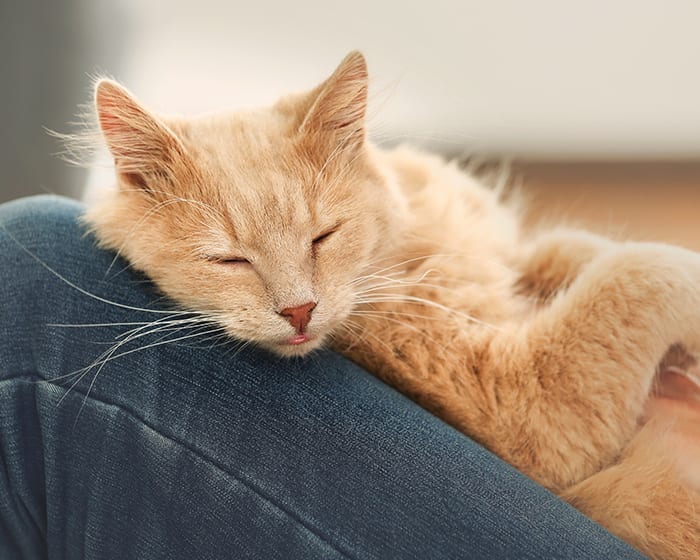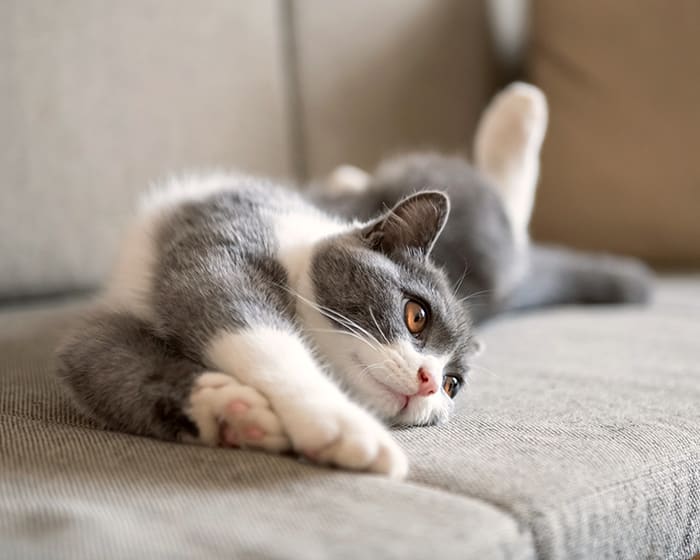
Feline Hyperthyroidism Treatment in Gaithersburg
Hyperthyroidism is the most common hormone disorder in cats. It is caused by growths within the thyroid gland which lead to excess thyroid hormone in the body. Thyroid growths are usually benign but can be malignant in rare cases.
Radioactive Iodine (or radioiodine) I-131 therapy has been used extensively in veterinary medicine and has a success rate approaching 95-98% for hyperthyroid cats with only one treatment.
I-131 (radio-iodine) therapy is a form of nuclear medicine used to cure feline hyperthyroidism. I-131 therapy has been used extensively in veterinary medicine and has a success rate approaching 95-98% for hyperthyroid cats with only one treatment.
The American Association of Feline Practitioners considers I-131 to be the treatment of choice for hyperthyroid cats.
FAQs About I-131 Therapy for Hyperthyroid Cats
- How does hyperthyroidism affect cats?
Hyperthyroidism is a very common endocrine disease of older cats. It causes an increased metabolic rate, which in turn causes a variety of signs including weight loss, vomiting, diarrhea, rapid or irregular heart rate, increased blood pressure, or other problems.
Occasionally, cats will not show any symptoms of hyperthyroidism but the disorder can be detected during wellness testing by your veterinarian.
- What are the treatment options for hyperthyroidism?
The three primary options for treatment of hyperthyroidism include surgical removal of the affected thyroid gland, medical therapy with methimazole or radioiodine therapy.
1. Surgery can be performed to remove the abnormal thyroid tissue. This treatment has been effective in curing hyperthyroidism in many cats but is less popular recently as safer and simpler options are now readily available.
2. Methimazole (generic, Tapazole, Felimazole) is a medicine that inhibits the production of thyroid hormone, thereby resolving symptoms of hyperthyroidism. This treatment is highly effective, readily available, and not very costly in the short term. The medication can be administered orally as a pill or liquid, or topically on the skin.
Long-term, this form of treatment may incur higher costs due to the repeat bloodwork and monitoring your cat must undergo to ensure the treatment is working and your cat is not having any negative side effects.
3. I-131 (radio-iodine) therapy is a form of nuclear medicine used to cure feline hyperthyroidism. This is a very simple, safe, and highly effective treatment. The vast majority of cats treated with I-131 will be cured of hyperthyroidism. In rare cases (<5%), some cats may require a second treatment or develop hypothyroidism (under-active thyroid gland) that requires daily thyroid hormone supplementation.
- How does I-131 work? The thyroid gland is the only part of the body that uses iodine, a nutrient that is essential to synthesize thyroid hormones. I-131 is a form of iodine that is radioactive. I-131 is given by injection and circulates in the blood until it is taken into the thyroid gland. In hyperthyroid cats, the cells within the abnormal nodules are actively making an abundance of thyroid hormone, but the normal thyroid tissue is suppressed and not making any thyroid hormone. Therefore, only the cells within the nodules will absorb the radioactive iodine. Once inside the abnormal thyroid cells, the radiation goes to work to destroy the abnormal cells.
- Why choose Veterinary Referral Associates to perform I-131 on your hyperthyroid cat? We are the only facility in Maryland to offer I-131 therapy with 24-hour on-site doctor supervision of your hyperthyroid cat. We are also the only facility in Maryland to offer board-certified specialists to oversee your hyperthyroid cat’s care before, during, and after the I-131 treatment.
- We are the only facility in the mid-Atlantic area to offer a thyroid scan before I-131, which is useful to confirm the diagnosis of hyperthyroidism, confirm the location of the abnormal thyroid glands, and suggest if hyperthyroidism is due to a benign or malignant tumor. The results of the thyroid scan also help determine the dose of I-131 needed to treat your cat’s hyperthyroidism.
- Why does my cat have to remain hospitalized for so long after treatment?
During treatment, small amounts of radiation will be emitted from your cat, so strict isolation in our facility is required to keep everyone safe. Once the level of radioactivity is below a certain limit, usually within five days, the cats are safe to go home.
While hospitalized, your cat will be monitored daily, through short visits and video, by a trained staff member as well as a board-certified veterinarian. Medications will be administered as needed, and we encourage you to bring a week’s supply of your cat’s favorite food.
Unfortunately, no personal effects can be returned so we suggest not leaving any cat toys or bedding (we will provide these).
Also, we cannot allow visitation until your cat is ready for discharge, but we will give you daily progress reports on your cat.
- What is required following discharge from the hospital?
For two weeks following discharge, we request that you follow some sensible safety measures while any remaining radiation is excreted from your cat’s body.
You will receive detailed written instructions that include limiting extensive contact (especially with children or pregnant women), washing hands after handling your cat or his/her litter box, and disposing of litter box waste. Your cat will also need to remain indoors during this time.
- Will my cat experience radiation sickness?
The treatment is given via a subcutaneous injection, similar to a vaccination. They do not experience radiation sickness. Radioactive iodine is a very safe and effective treatment and is used frequently in human medicine.
- How do I schedule an appointment for I-131 for my cat?
If you believe your cat is experiencing symptoms of hyperthyroidism or your doctor has diagnosed your cat with hyperthyroidism, please call us to schedule a consultation.


